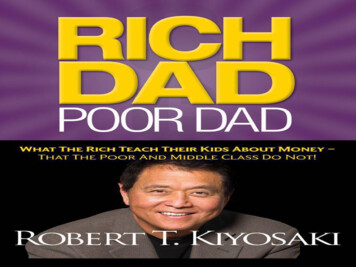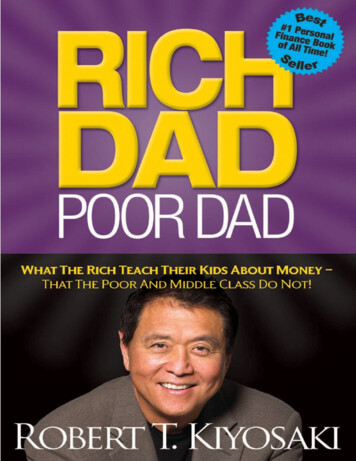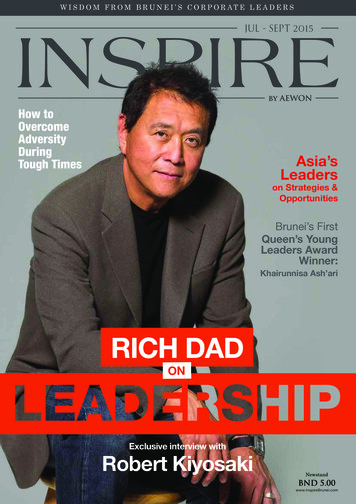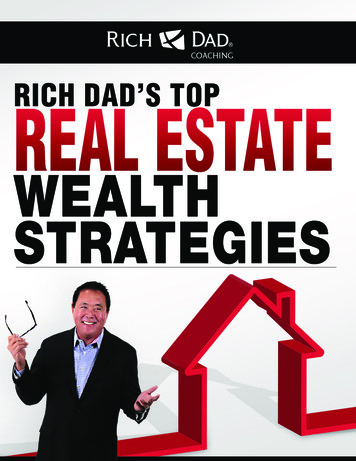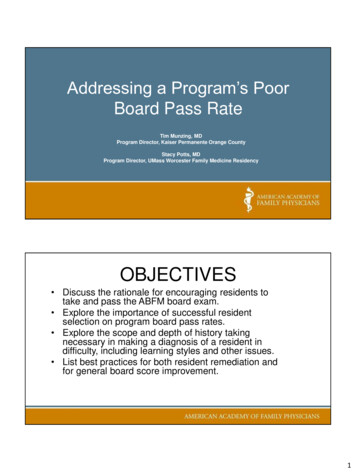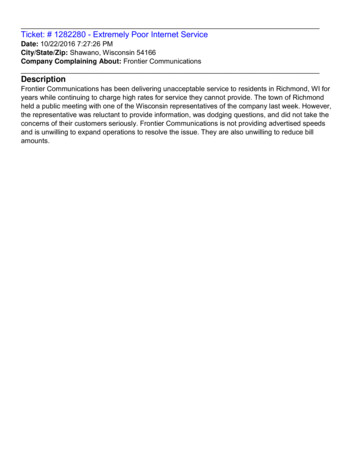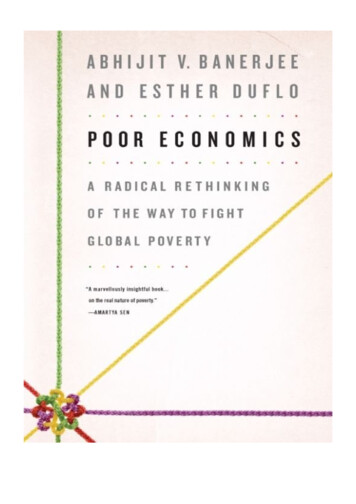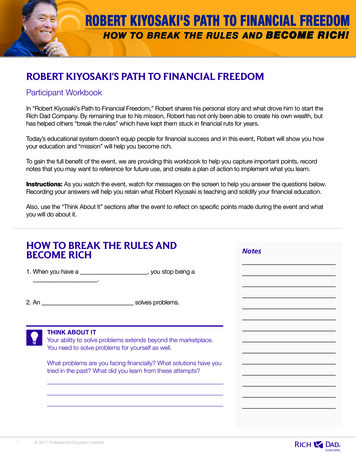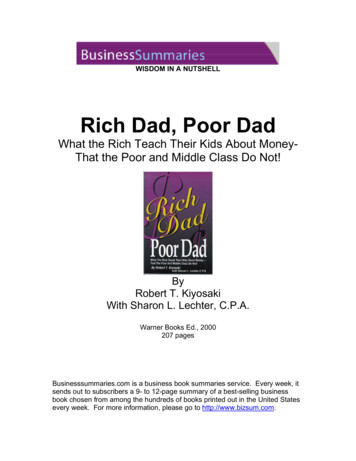
Transcription
WISDOM IN A NUTSHELLRich Dad, Poor DadWhat the Rich Teach Their Kids About MoneyThat the Poor and Middle Class Do Not!ByRobert T. KiyosakiWith Sharon L. Lechter, C.P.A.Warner Books Ed., 2000207 pagesBusinesssummaries.com is a business book summaries service. Every week, itsends out to subscribers a 9- to 12-page summary of a best-selling businessbook chosen from among the hundreds of books printed out in the United Statesevery week. For more information, please go to http://www.bizsum.com.
Rich Dad, Poor DadPage 2The Big IdeaFINANCIAL LITERACY FINANCIAL INDEPENDENCEA true tale of two dads— one a highly educated professor, the other, an eighthgrade dropout. Educated dad left his family with nothing, except maybe someunpaid bills. The dropout later became one of Hawaii’s richest men and left hisson an empire. One dad would say, “I can’t afford it” while the other, asked, “Howcan I afford it?”Rich dad teaches two boys priceless lessons on money, by making them learnthrough experience. The most important lesson of all is How to Use Your Mindand Time to create personal wealth. Free yourself from the proverbial “rat race”.Learn to spot opportunities, create solutions and “mind your own business”.Learn to make money work for you, and not be its slave.Rich Dad’s Words of Wisdom: You are what you Think.A job is a short-term solution to a long-term problem.A highly paid slave is still a slave.Why climb the corporate ladder when you can own the ladder?Good Thinking:Two roads diverged in a wood, and I—I took the one less traveled by,And that has made all the difference.Robert Frost, from ‘The Road Not Taken’OverviewThere is a Need.The rationale for teaching people financial literacy comes from the factthere is no real job security these days. Even after years of toil, the poorand middle class may find they do not have sufficient funds for theirchildren’s college education, or their own retirement. Why work for acorporation, the government, and the bank all your life? Awaken yourfinancial genius and gain financial independence and freedom!www.bizsum.com 2001 Copyright BusinessSummaries.com
Rich Dad, Poor DadPage 3Lesson 1: The Rich Don’t Work For MoneyAt age 9, Robert Kiyosaki and his best friend Mike asked Mike’s father (RichDad) to teach them how to make money. After 3 weeks of dusting cans in one ofRich Dad’s convenience stores at 10 cents a week, Kiyosaki was ready to quit.Rich Dad pointed out this is exactly what his employees sounded like. Somepeople quit a job because it doesn’t pay well. Others see it as an opportunity tolearn something new.WORK TO LEARNNext Rich Dad put the two boys to work, this time for nothing. Doing this forcedthem to think up a source of income, a business scheme. The opportunity cameto them upon noticing discarded comic books in the store. The first business planwas hatched. The boys opened a comic book library and employed Mike’s sisterat 1 a week to mind it. Soon they were earning 9.50 a week without having tophysically run the library, while kids read as much comics as they could in twohours after school for only a few cents.Lesson 2: Why Teach Financial Literacy?They don’t teach this at school.The growing gap between rich and poor is rooted in the antiquatededucational system. The system trains people to be good employees, andnot employers. The obsolete school system also fails to provide youngpeople with basic financial skills rich people use to grow their wealth.Know your options and use this knowledge to build a formidable assetcolumn.In an age of instant millionaires it really isn’t about how much money youmake, it’s about how much you keep, and how many generations you cankeep it.Steps to get out of the proverbial rat race:1. First, understand the difference between an asset and a liability.Assets Real Estate Stocks Bonds Notes Intellectual Propertywww.bizsum.comLiabilities Mortgages Consumer Loans Credit Cards 2001 Copyright BusinessSummaries.com
Rich Dad, Poor DadPage 4The poor have day-to-day expenses, the middle class purchase liabilitiesthat they think are assets (i.e., a home or a car), and the rich build a solidbase of income-generating assets.The middle class finds itself in a constant state of financial struggle. Theirprimary income is wages, as wages increase, so do their taxes. Expensesincrease as wages increase. Hence the phrase “the rat race.” They treattheir home as their primary asset instead of investing in incomegenerating assets.The rich get richer because they keep acquiring more assets andinvestments to generate more income, which far exceeds their expenses.Reasons why the home is not an asset but a liability:1.2.3.4.5.People work almost all their lives to pay off a home (30-year loans)Maintenance and utilities expenses.Property taxHouse values can depreciate.Instead of investing in income-earning assets, your money goes out topayments for the house.Your losses:1. Time that could have been used to grow value in other assets.2. Capital which could have been invested rather than paying home-relatedexpenses3. Education that makes you a Sophisticated investorIf you want to buy a house, first generate the cash flow by acquiringassets, which bring income to pay for it.Examples of real assets are: Apartments for rent Real estate Businesses that do not require your physical presence. You hiremanagers.Average time of holding on to an asset before selling it for a higher value:1 year Stocks (Startups and small companies are good investments) Bonds Mutual fundswww.bizsum.com 2001 Copyright BusinessSummaries.com
Rich Dad, Poor DadPage 57 years Real estate Notes (IOUs) Royalties on intellectual property Valuables that produce income or appreciateIn summary, the key steps to getting out of the rat race are the ff:1. Understand the difference between an asset and a liability.2. Concentrate your efforts on buying income-earning assets.3. Focus on keeping liabilities and expenses at a minimum.4. Mind your own business.Lesson 3: Mind Your Own BusinessKEEP YOUR DAY JOBBUT START MINDING YOUR OWN BUSINESS.Kiyosaki sold photocopiers on commission at Xerox. With his earnings hepurchased real estate. In 3 years’ time his real estate income was far greaterthan his earnings at Xerox. He then left the company to mind his own businessfull time. He knew that in order to get out of the rat race fast, he needed to workharder, sell more copiers and mind his own business.Don’t spend all your wages. Build a good portfolio of assets and you can spendlater when these assets bring you greater income.Lesson 4: The History of Taxes and the Power of CorporationsIncome tax has been levied on citizens in England since 1874. In theUnited States it was introduced in 1913. Since then what was initially aplan to tax only the rich eventually “trickled down” to the middle class andthe poor.The rich have a secret weapon to shelter themselves from heavy taxation.It’s called the Corporation. It isn’t a building with the company name andlogo in brass signage out front. A corporation is simply a legal document inyour attorney’s file cabinet duly registered under a government stateagency. Corporations offer great tax advantages and protection fromlawsuits. It’s the legal way to protect your wealth, and the rich have beenusing it for generations. Do your own research and find out what taxlaws will bring you the best advantages.www.bizsum.com 2001 Copyright BusinessSummaries.com
Rich Dad, Poor DadPage 6The Golden Rule: PAY YOURSELF FIRST.Rich dad says paying yourself first forces you to create more sources ofincome to cover your expenses. It’s a simple rule that works like this:The Rich with CorporationsEarnPeople who work forcorporations:EarnSpendPay taxesPay taxesSpendKey Financial IQ Components:It helps to take some courses to gain financial literacy; rich dad stressesthe importance of learning –1. Accounting. It pays to know how to read financial statements. Whenacquiring businesses or assets you need to quickly see the financialstanding of the company you are acquiring. Many grown adults do notknow how to balance a balance sheet. In the long term, this knowledgewill pay off for you and your business.2. Investment Strategy. This skill will sharpen with experience. Talk toinvestors and observe how they play the game. Kiyosaki and Mikespent many boyhood hours sitting in on Rich Dad’s meetings withbrokers, accountants, and attorneys.3. Market Behavior. Know the laws of Supply and Demand. No businessowner can do without understanding these basic principles of themarket. Bill Gates saw what people needed. Open your eyes toopportunities. Look at what sells and who buys.4. Law Kiyosaki recommends doing everything you can to grow yourbusiness within legal boundaries. Know your corporate, state, andaccounting laws.Lesson 5: The Rich Invent MoneySelf-confidence coupledwith high financial IQ can certainly earn more for youthan merely saving a little bit every month.Make good use of your time and find the best deals.An example: In the early 90’s the Phoenix economy was bad. Homes oncevalued at 100,000 sold for 75,000. Kiyosaki shopped at bankruptcy courts andbought the same houses at only 20,000. He resold these properties for 60,000www.bizsum.com 2001 Copyright BusinessSummaries.com
Rich Dad, Poor DadPage 7making a cool 40,000 profit. After six more transactions of the same manner hemade a total 190,000 in profit and it only took 30 hours of work time.Rich Dad explains there are Two Types of Investors:1. Buyers of Packaged Investments.This is when you call a retail outlet, real estate company, stockbrokeror financial planner and put your money in ready-made investments.It’s a simple, clean way of investing.2. The Professional InvestorDesign your own investment. Assemble a deal and put togetherdifferent components of an opportunity. Rich dad encourages this type.You need to develop three main skills to be this type of investor,namely how to:o Identify an opportunity everyone else has missed.o Raise capitalo Organize smart peopleIdentify an opportunity everyone else has missed.Learn to identify hidden Freebies in business deals. For example: The realbusiness of McDonald’s isn’t hamburgers. It’s the free real estate underneatheach franchise, on every important intersection, in cities all over the world that isthe real wealth of its owners.THERE IS ALWAYS RISK. You need to learn how to manage risk and not avoidit.Lesson 6: Work to Learn –Don’t Work for MoneyThe Author’s OdysseyAfter college graduation Robert Kiyosaki joined the Marine Corps. He learned tofly for the love of it. He also learned to lead troops, an important part ofmanagement training. His next move was to join Xerox where he learned toovercome his fear of rejection. The thought of knocking on doors and sellingcopiers terrified him. Soon he was among the top 5 salespeople at the company.For a couple of years he was No.1. Having achieved his objective – overcominghis shyness and fear—he quit and began minding his own business.Learn skills like PR, marketing, and advertising.Take a second job if it means learning more.www.bizsum.com 2001 Copyright BusinessSummaries.com
Rich Dad, Poor DadPage 8A Difference in EducationSchools train professionals. Professionals become so specialized they cannotapply themselves in other fields and need to form unions to protect their jobs.Remember you can have a profession, say, learn to be a pilot if you want to learnhow to fly, but at the same time mind your own business.The rich “groom” the next generation by training the heir in all aspects of runningthe business. They move him from department to department so he learns howeach one relates to the other. Specialization is not the key here, but picking upimportant lessons from each area and seeing the business as a whole.Rich Dad groomed Kiyosaki and Mike in the same manner. Mike would later takeover Rich Dad’s empire, which included restaurants, convenience stores, and aconstruction company. Kiyosaki created his own empire with real estate, newproducts and educational materials.Three Main Management Skills1. Management of Cash Flow2. Management of Systems (Includes Time with family and time for your self)3. Management of PeopleFive Obstacles to Financial Independence1. Fear. Don’t play it safe and cling to what you think is secure. If you don’tgo for it and think big you won’t be able to earn big.2. Cynicism. Don’t listen to advice of others who are not doing what youintend to do. Listen to your self and those who are doing what you aim todo.3. Laziness. Greed is good and fights laziness. Think about the freedom andmoney you’ll have and you will put in those extra work hours. Change yourthinking. Instead of saying “I can’t afford it.” Ask yourself “How can I affordit?” Challenge your mind to create solutions.4. Bad Habits. Spending habits should turn into saving and investing habits.5. Arrogance. Don’t think you know everything there is to know aboutmoney. Listen to others. Enroll in useful seminars.Ten Steps to Awaken Your Financial Genius:1. Find a reason greater than reality, a big dream. Think of the freedom,the lifestyle wherein you control your own time. Think of what you don’twant, i.e. “I don’t like being an employee”.2. Use the power of choice, daily. You can choose to watch MTV, or watchCNBC. It’s how you choose to use your time and energy everyday thatbrings financial success in the long run.www.bizsum.com 2001 Copyright BusinessSummaries.com
Rich Dad, Poor DadPage 93. Choose your friends carefully. It pays to have friends who are focusedand achieving their goals. Surround yourself with friends you can learnfrom.4. Master a formula. Learn a new one, and learn fast.5. Pay yourself first. Practice self-discipline by keeping expenses low.Tenants can pay for your expenses if you rent out apartments or ministorage, for instance. Savings are used for investing and creating moremoney, not for paying bills.6. Pay your broker
Rich Dad, Poor Dad Page 4 The poor have day-to-day expenses, the middle class purchase liabilities that they think are assets (i.e., a home or a car), and the rich build a solid base of income-generating assets. The middle class finds itself in a constant state of financial struggle. Their primary income is wages, as wages increase, so do their taxes. Expenses increase as wages increase. Hence .
